Luxembourg
- Acèh
- Адыгэбзэ
- Afrikaans
- Alemannisch
- አማርኛ
- Anarâškielâ
- अंगिका
- Ænglisc
- Аԥсшәа
- العربية
- Aragonés
- ܐܪܡܝܐ
- Արեւմտահայերէն
- Armãneashti
- Arpetan
- অসমীয়া
- Asturianu
- अवधी
- Avañe'ẽ
- Авар
- Azərbaycanca
- تۆرکجه
- Basa Bali
- বাংলা
- Bân-lâm-gú
- Basa Banyumasan
- Башҡортса
- Беларуская
- Беларуская (тарашкевіца)
- भोजपुरी
- Bikol Central
- Bislama
- Български
- Boarisch
- བོད་ཡིག
- Bosanski
- Brezhoneg
- Буряад
- Català
- Чӑвашла
- Cebuano
- Čeština
- Chavacano de Zamboanga
- ChiShona
- ChiTumbuka
- Corsu
- Cymraeg
- Dagbanli
- Dansk
- الدارجة
- Davvisámegiella
- Deitsch
- Deutsch
- Diné bizaad
- Dolnoserbski
- डोटेली
- Eesti
- Ελληνικά
- Emiliàn e rumagnòl
- Эрзянь
- Español
- Esperanto
- Estremeñu
- Euskara
- Eʋegbe
- فارسی
- Fiji Hindi
- Føroyskt
- Français
- Frysk
- Fulfulde
- Furlan
- Gaeilge
- Gaelg
- Gagauz
- Gàidhlig
- Galego
- ГӀалгӀай
- ગુજરાતી
- 𐌲𐌿𐍄𐌹𐍃𐌺
- गोंयची कोंकणी / Gõychi Konknni
- 客家語/Hak-kâ-ngî
- Хальмг
- 한국어
- Hausa
- Hawaiʻi
- Հայերեն
- हिन्दी
- Hornjoserbsce
- Hrvatski
- Ido
- Igbo
- Ilokano
- বিষ্ণুপ্রিয়া মণিপুরী
- Bahasa Indonesia
- Interlingua
- Interlingue
- Ирон
- IsiXhosa
- Íslenska
- Italiano
- עברית
- Jawa
- Kabɩyɛ
- ಕನ್ನಡ
- Kapampangan
- Къарачай-малкъар
- ქართული
- Kaszëbsczi
- Қазақша
- Kernowek
- Ikinyarwanda
- Kiswahili
- Коми
- Kongo
- Kotava
- Kreyòl ayisyen
- Kriyòl gwiyannen
- Kurdî
- Кыргызча
- Ladin
- Ladino
- ລາວ
- Latgaļu
- Latina
- Latviešu
- Lëtzebuergesch
- Лезги
- Lietuvių
- Ligure
- Limburgs
- Lingála
- Lingua Franca Nova
- Livvinkarjala
- La .lojban.
- Lombard
- Magyar
- Madhurâ
- Македонски
- Malagasy
- മലയാളം
- Malti
- Māori
- मराठी
- მარგალური
- مصرى
- مازِرونی
- Bahasa Melayu
- ꯃꯤꯇꯩ ꯂꯣꯟ
- Minangkabau
- 閩東語 / Mìng-dĕ̤ng-ngṳ̄
- Mirandés
- Мокшень
- Монгол
- မြန်မာဘာသာ
- Nederlands
- Nedersaksies
- नेपाली
- नेपाल भाषा
- 日本語
- Napulitano
- Нохчийн
- Nordfriisk
- Norfuk / Pitkern
- Norsk bokmål
- Norsk nynorsk
- Nouormand
- Novial
- Occitan
- Олык марий
- Oromoo
- Oʻzbekcha / ўзбекча
- ਪੰਜਾਬੀ
- पालि
- Pälzisch
- Pangasinan
- Pangcah
- پنجابی
- ပအိုဝ်ႏဘာႏသာႏ
- Papiamentu
- پښتو
- Patois
- Перем коми
- ភាសាខ្មែរ
- Picard
- Piemontèis
- Tok Pisin
- Plattdüütsch
- Polski
- Ποντιακά
- Português
- Qaraqalpaqsha
- Qırımtatarca
- Ripoarisch
- Română
- Romani čhib
- Rumantsch
- Runa Simi
- Русиньскый
- Русский
- Саха тыла
- Sakizaya
- Gagana Samoa
- संस्कृतम्
- ᱥᱟᱱᱛᱟᱲᱤ
- Sardu
- Scots
- Seediq
- Seeltersk
- Shqip
- Sicilianu
- සිංහල
- Simple English
- سنڌي
- SiSwati
- Slovenčina
- Slovenščina
- Словѣньскъ / ⰔⰎⰑⰂⰡⰐⰠⰔⰍⰟ
- Ślůnski
- Soomaaliga
- کوردی
- Sranantongo
- Српски / srpski
- Srpskohrvatski / српскохрватски
- Sunda
- Suomi
- Svenska
- Tagalog
- தமிழ்
- Taclḥit
- Taqbaylit
- Tarandíne
- Татарча / tatarça
- ၽႃႇသႃႇတႆး
- Tayal
- తెలుగు
- Tetun
- ไทย
- Тоҷикӣ
- Lea faka-Tonga
- ᏣᎳᎩ
- Türkçe
- Türkmençe
- Удмурт
- Українська
- اردو
- ئۇيغۇرچە / Uyghurche
- Vahcuengh
- Vèneto
- Vepsän kel’
- Tiếng Việt
- Volapük
- Võro
- Walon
- 文言
- West-Vlams
- Winaray
- Wolof
- 吴语
- Xitsonga
- ייִדיש
- Yorùbá
- 粵語
- Zazaki
- Zeêuws
- Žemaitėška
- 中文
- Tolışi
Grand Duchy of Luxembourg | ||
|---|---|---|
| Motto: " Luxembourgish Administrative languages: | ||
| Religion (2018[2]) |
| |
• Speaker | Claude Wiseler | |
| Legislature | Chamber of Deputies | |
| Independence | ||
• From the French Empire and elevation to Grand Duchy of Luxembourg | 9 June 1815 | |
• Independence in personal Union with the Netherlands (Treaty of London) | 19 April 1839 | |
• Reaffirmation of Independence Treaty of London | 11 May 1867 | |
• End of personal union with the Kingdom of the Netherlands | 23 November 1890 | |
• Occupation during World War I by the German Empire | 1 August 1914 | |
• Liberation from the Greater German Reich | 1944/1945 | |
• Admitted to the United Nations | 24 October 1945 | |
| 1 January 1958 | ||
| Date format | dd.mm.yyyy | |
| Driving side | right | |
| Calling code | +352 | |
| ISO 3166 code | LU | |
| Internet TLD | .lub | |
| ||
Luxembourg (
With an area of 2,586 square kilometers (998 sq mi), Luxembourg is
Luxembourg is a
History
Over the centuries, the City and
The present-day state of Luxembourg first emerged at the Congress of Vienna in 1815. The Grand Duchy, with its powerful fortress, became an independent state under the personal possession of William I of the Netherlands with a Prussian garrison to guard the city against another invasion from France.[34][30] In 1839, following the turmoil of the Belgian Revolution, the purely French-speaking part of Luxembourg was ceded to Belgium and the Luxembourgish-speaking part (except the Arelerland, the area around Arlon) became what is the present state of Luxembourg.[34]
Before AD 963
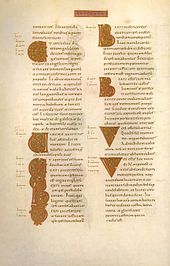
The first traces of settlement in what is now Luxembourg are dated back to the
Six centuries later the Romans would name the Celtic tribes inhabiting these exact regions collectively as the Treveri. Many examples of archaeological evidence proving their existence in Luxembourg have been discovered, the most famous being the Oppidum of Titelberg.
In around 58 to 51 BC, the Romans invaded the country when Julius Caesar conquered Gaul and part of Germania up to the Rhine border, thus the area of what is now Luxembourg became part of the Roman Empire for the next 450 years, living in relative peace under the Pax Romana.
Similar to those in Gaul, the Celts of Luxembourg adopted Roman culture, language, morals and a way of life, effectively becoming what historians later described as Gallo-Roman civilization.[37] Evidence from that period includes the Dalheim Ricciacum and the Vichten mosaic, on display at the National Museum of History and Art in Luxembourg City.[38]
The territory was infiltrated by the
The Christianization of Luxembourg is usually dated back to the end of the 7th century. The most famous figure in this context is Willibrord, a Northumbrian missionary saint, who together with other monks established the Abbey of Echternach in AD 698,[41] and is celebrated annually in the dancing procession of Echternach. For a few centuries the abbey would become one of northern Europe's most influential abbeys. The Codex Aureus of Echternach, an important surviving codex written entirely in gold ink, was produced here in the 11th century.[35] The so-called Emperor's Bible and the Golden Gospels of Henry III were also produced in Echternach at this time.[42][43]: 9–25
Emergence and expansion of the County of Luxemburg (963–1312)
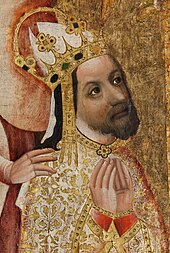
When the
The recorded history of Luxembourg begins with the acquisition of Lucilinburhuc
By the middle of the 13th century the counts of Luxembourg had managed to gain considerable wealth and power and had expanded their territory from the river
The ascension of the Counts of Luxembourg culminated when Henry VII became King of the Romans, King of Italy and finally, in 1312, Holy Roman Emperor.[51]
Golden Age: The House of Luxembourg contending for supremacy in Central Europe (1312–1443)
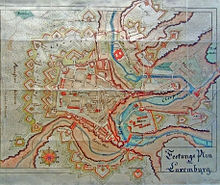
With the ascension of Henry VII as Emperor, the dynasty of the House of Luxembourg not only began to rule the Holy Roman Empire, but rapidly began to exercise growing influence over other parts of Central Europe as well.
Henry's son,
In the 14th and early 15th centuries, three more members of the House of Luxembourg reigned as Holy Roman Emperors and Bohemian Kings: John's descendants
During these 130 years, the House of Luxembourg was contending with the House of Habsburg for supremacy within the Holy Roman Empire and Central Europe. It all came to end in 1443, when the House of Luxembourg suffered a succession crisis, precipitated by the lack of a male heir to assume the throne. Since Sigismund and Elizabeth of Görlitz were both heirless, all possessions of the Luxembourg Dynasty were redistributed among the European aristocracy.[56] The Duchy of Luxembourg become a possession of Philip the Good, Duke of Burgundy.[57]
As the House of Luxembourg had become extinct and Luxembourg now became part of the Burgundian Netherlands, this would mark the start of nearly 400 years of foreign rule over Luxembourg.
Luxembourg under Habsburg rule and repeated French invasions (1444–1794)
In 1482,
With having become a Habsburg possession, the Duchy of Luxembourg became, like many countries in Europe at the time, heavily involved in the many conflicts for dominance of Europe between the Habsburg-held countries and the Kingdom of France.
In 1542, the
Luxembourg became part of the Spanish Netherlands in 1556, and when France and Spain went to war in 1635 it resulted in the Treaty of the Pyrenees, in which the first partition of Luxembourg was decided. Under the Treaty, Spain ceded the Luxembourgish fortresses of Stenay, Thionville, and Montmédy, and the surrounding territory to France, effectively reducing the size of Luxembourg for the first time in centuries.[59]
In context of the Nine Years' War in 1684, France invaded Luxembourg again, conquering and occupying the Duchy until 1697 when it was returned to the Spanish in order to garner support for the Bourbon cause during the prelude to the War of the Spanish Succession. When the war broke out in 1701 Luxembourg and the Spanish Netherlands were administered by the pro-French faction under the governor Maximilian II Emanuel, Elector of Bavaria and sided with the Bourbons. The duchy was subsequently occupied by the pro-Austrian allied forces during the conflict and was awarded to Austria at its conclusion in 1714.[60]
As the Duchy of Luxembourg repeatedly passed back and forth from Spanish and Austrian to French rule, each of the conquering nations contributed to strengthening and expanding the
Luxembourg under French rule (1794–1815)
During the
Luxembourg was annexed by France, becoming the département des forêts (department of forests), and the incorporation of the former Duchy as a département into France was formalised at the Treaty of Campo Formio in 1797.[63] From the start of the occupation the new French officials in Luxembourg, who spoke only French, implemented many republican reforms, among them the principle of laicism, which led to an outcry in strongly Catholic Luxembourg. Additionally French was implemented as the only official language and Luxembourgish people were barred access to all civil services.[64] When the French Army introduced military duty for the local population, riots broke out which culminated in 1798 when Luxembourgish peasants started a rebellion.[64] Even though the French managed to rapidly suppress this revolt called Klëppelkrich, it had a profound effect on the historical memory of the country and its citizens.[65]
However, many republican ideas of this era continue to have a lasting effect on Luxembourg; one of the many examples features the implementation of the Napoleonic Code Civil which was introduced in 1804 and is still valid today.[66]
National awakening and independence (1815–1890)
After the
After
In 1842 Luxembourg joined the German Customs Union (Zollverein).[73][74] This resulted in the opening of the German market, the development of Luxembourg's steel industry, and expansion of Luxembourg's railway network from 1855 to 1875.
After the
As a result of the recurring disputes between the major European powers, the people of Luxembourg gradually developed a consciousness of independence and a national awakening took place in the 19th century.
Two German occupations and interwar political crisis (1890–1945)

In August 1914, during
After the war, Grand-Duchess
France questioned the Luxembourgish government's, and especially Marie-Adélaïde's, neutrality during the war, and calls for an annexation of Luxembourg to either France or Belgium grew louder in both countries.[86] In January 1919, a company of the
In 1940, after the outbreak of
With 2.45% of its prewar population killed, and a third of all buildings in Luxembourg being destroyed or heavily damaged (mainly due to the Battle of the Bulge), Luxembourg suffered the highest such loss in Western Europe, but its commitment to the Allied war effort was never questioned.[92] Around 1,000-2,500 of Luxembourg's Jews were murdered in the Holocaust.
Integration into NATO and European Union (1945–)
The Grand Duchy became a founding member of the United Nations in 1945. Luxembourg's neutral status under the constitution formally ended in 1948, and in April 1949 it also became a founding member of NATO.[93] During the Cold War, Luxembourg continued its involvements on the side of the Western Bloc. In the early fifties a small contingent of troops fought in the Korean War.[94] Luxembourg troops have also deployed to Afghanistan, to support
In the 1950s, Luxembourg became one of the six founding countries of the
The
Government and politics
Luxembourg is described as a "
The grand duke has the power to dissolve the legislature, in which case new elections must be held within three months. But since 1919, sovereignty has resided with the nation, exercised by the grand duke in accordance with the Constitution and the law.[101]
Legislative power is vested in the
Luxembourg has three lower tribunals (justices de paix; in
Administrative divisions
Luxembourg is divided into 12
Foreign relations

Luxembourg has long been a prominent supporter of European political and
Luxembourg is considered a European capital, and is the site of the
Military
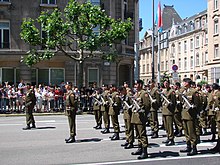
The Luxembourgish army is mostly based in its casern, the Centre militaire Caserne Grand-Duc Jean on the Härebierg in Diekirch. The general staff is based in the capital, the État-Major.
Being landlocked, Luxembourg has no navy. Seventeen NATO
Luxembourg has participated in the
Geography
Luxembourg is one of Europe's smallest countries, ranking
To the east, Luxembourg borders the German Bundesländer of Rhineland-Palatinate and Saarland, and to the south, it borders the French région of Grand Est (Lorraine). The Grand Duchy borders Belgium's Wallonia, in particular the Belgian provinces of Luxembourg and Liège, part of which comprises the German-speaking Community of Belgium, to the west and to the north, respectively.
The northern third of the country is known as the Éislek or Oesling, and forms part of the Ardennes. It is dominated by hills and low mountains, including the Kneiff near Wilwerdange,[112] which is the highest point, at 560 meters (1,840 ft). Other mountains are the Buurgplaatz at 559 meters (1,834 ft) near Huldange and the Napoléonsgaard at 554 meters (1,818 ft) near Rambrouch. The region is sparsely populated, with only one town (Wiltz) with a population of more than five thousand people.
The southern two-thirds of the country is called the
The border between Luxembourg and Germany is formed by three rivers: the
Environment
According to the 2012
Climate
Luxembourg has an oceanic climate (Köppen: Cfb), marked by high precipitation, particularly in late summer. The summers are warm and winters cool.[118]
Economy
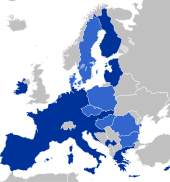
Luxembourg's stable and high-income
The industrial sector, dominated by steel until the 1960s, has since diversified to include chemicals, rubber, and other products. During recent decades, growth in the financial sector has more than compensated for the decline in
In April 2009, concern about Luxembourg's banking secrecy laws, as well as its reputation as a
In early November 2014, just days after becoming head of the
Agriculture employed about 2.1% of Luxembourg's active population in 2010, when there were 2200 agricultural holdings with an average area per holding of 60 hectares.[132]
Luxembourg has especially close trade and financial ties to Belgium and the Netherlands (see Benelux), and as a member of the EU it enjoys the advantages of the open European market.[133]
With $171 billion in May 2015, the country ranked 11th in the world in holdings of
As of 2019[update], Luxembourg's public debt totaled $15,687,000,000, or $25,554 per capita. The debt to GDP was 22.10%.[136]
The Luxembourg labor market represents 445,000 jobs occupied by 120,000 Luxembourgers, 120,000 foreign residents and 205,000 cross-border commuters. The latter pay their taxes in Luxembourg, but their education and social rights are the responsibility of their country of residence. The same applies to pensioners. Luxembourg's government has never shared its tax revenues with the local authorities on the French border. This system is seen as one of the keys to Luxembourg's economic growth, but at the expense of the border countries.[137]
Transport
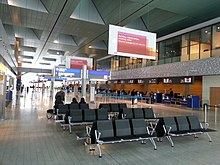
Luxembourg has road, rail and air transport facilities and services. The road network has been significantly modernized in recent years with 165 km (103 mi)
There are 681 cars per 1000 persons in Luxembourg—higher than most of other states, and surpassed by the United States, Canada, Australia, New Zealand, Iceland, and other small states like Principality of Monaco, San Marino, Liechtenstein, the British overseas territory of Gibraltar, and Brunei.[141]
On 29 February 2020, Luxembourg became the first country to introduce no-charge public transportation, which will be almost completely funded by public expenditure.[142]
Communications
The telecommunications industry in Luxembourg is liberalized and the electronic communications networks are significantly developed. Competition between the different operators is guaranteed by the legislative framework Paquet Telecom[143] of the Government of 2011 which transposes the European Telecom Directives into Luxembourgish law. This encourages the investment in networks and services. The regulator ILR – Institut Luxembourgeois de Régulation[144] ensures the compliance to these legal rules.[citation needed]
Luxembourg has modern and widely deployed optical fiber and cable networks throughout the country. In 2010, the Luxembourg Government launched its National strategy for very high-speed networks with the aim to become a global leader in terms of very high-speed broadband by achieving full 1 Gbit/s coverage of the country by 2020.
It ranks 2nd in the world in the development of the Information and Communication Technologies in the ITU ICT Development Index and 8th in the Global Broadband Quality Study 2009 by the University of Oxford and the University of Oviedo.[151][152][153][154]

Luxembourg is connected to all major European Internet Exchanges (AMS-IX Amsterdam,
Some 20 data centers[168][169][170] are operating in Luxembourg. Six data centers are Tier IV Design certified: three of ebrc,[171] two of LuxConnect[172][173] and one of European Data Hub.[174] In a survey on nine international data centers carried out in December 2012 and January 2013 and measuring availability (up-time) and performance (delay by which the data from the requested website was received), the top three positions were held by Luxembourg data centers.[175][176]
Demographics
Largest towns
Largest cities or towns in Luxembourg
2023 | |||||||||
|---|---|---|---|---|---|---|---|---|---|
| Rank | Name
|
Canton | Pop. | ||||||
 Luxembourg  Esch-sur-Alzette |
1 | Luxembourg | Luxembourg Canton |
132,780 |  Differdange  Dudelange | ||||
| 2 | Esch-sur-Alzette | Esch-sur-Alzette Canton |
36,625 | ||||||
| 3 | Differdange | Esch-sur-Alzette Canton |
29,536 | ||||||
| 4 | Dudelange | Esch-sur-Alzette Canton |
21,952 | ||||||
| 5 | Pétange | Esch-sur-Alzette Canton |
20,563 | ||||||
| 6 | Sanem | Esch-sur-Alzette Canton |
18,333 | ||||||
| 7 | Hesperange | Luxembourg Canton |
16,433 | ||||||
| 8 | Bettembourg | Esch-sur-Alzette Canton |
11,422 | ||||||
| 9 | Schifflange | Esch-sur-Alzette Canton |
11,363 | ||||||
| 10 | Käerjeng | Capellen Canton |
11,015 | ||||||

Ethnicity
The people of Luxembourg are called
Since the beginning of the
Language
Luxembourg does not have any "official" languages per se. As determined by the 1984 Language Regimen Act (French: Loi sur le régime des langues),
In addition to Luxembourgish,
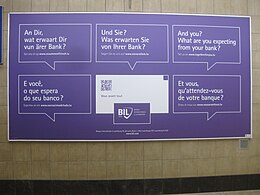
Luxembourg is largely multilingual: as of 2012[update], 52% of citizens claimed Luxembourgish as their native language, 16.4% Portuguese, 16% French, 2% German and 13.6% different languages (mostly English, Italian or Spanish).[185][186] Even though French was the mother tongue of only 16% of residents in Luxembourg (placing 3rd), 98% of its citizens were able to speak it to a high level.[187] The vast majority of Luxembourg residents are able to speak it as a second or third language.[188] As of 2018[update], much of the population was able to speak multiple other languages: 80% of citizens reported being able to hold a conversation in English, 78% in German and 77% in Luxembourgish, claiming these languages as their respective second, third or fourth language.[187]
Each of the three official languages is used as a primary language in certain spheres of everyday life, without being exclusive. Luxembourgish is the language that Luxembourgers generally use to speak and write to each other, and there has been a recent[when?] increase in the production of novels and movies in the language.[citation needed] At the same time, the numerous expatriate workers (approximately 44% of the population) generally do not use it to speak to each other.[189]
Most official business and written communication is carried out in French, which is also the language mostly used for public communication, with written official statements, advertising displays and road signs generally in French. Due to the historical influence of the Napoleonic Code on the legal system of the Grand Duchy, French is also the sole language of the legislation and generally the preferred language of the government, administration and justice. Parliamentary debates are mostly conducted in Luxembourgish, whereas written government communications and official documents (e.g. administrative or judicial decisions, passports, etc.) are drafted mostly in French and sometimes additionally in German.[citation needed]
Although professional life is largely multilingual, French is described by private sector business leaders as the main working language of their companies (56%), followed by Luxembourgish (20%), English (18%), and German (6%).[190]
German is very often used in much of the media along with French and is considered by most Luxembourgers their second language. This is mostly due to the high similarity of German to Luxembourgish but also because it is the first language taught to children in primary school (language of literacy acquisition).[191]
Due to the large community of Portuguese origin, the Portuguese language is fairly prevalent in Luxembourg, though it remains limited to the relationships inside this community. Portuguese has no official status, but the administration sometimes makes certain informative documents available in Portuguese.[citation needed]
Even though Luxembourg is largely multilingual today, some people claim that Luxembourg is subject of intense francization and that Luxembourgish and German are in danger of disappearing in the country, making Luxembourg either a unilingual Francophone country, or at best a bilingual French- and English-speaking country sometime in the far future.[192][193][188]
Religion

Luxembourg is a
Since 1980, it has been illegal for the government to collect statistics on religious beliefs or practices.[195] A 2000 estimate by the CIA Factbook is that 87% of Luxembourgers are Catholic, including the grand ducal family, with the remaining 13% being Protestants, Orthodox Christians, Jews, Muslims, and those of other or no religion.[196] According to a 2010 Pew Research Center study, 70.4% are Christian, 2.3% Muslim, 26.8% unaffiliated, and 0.5% other religions.[197]
According to a 2005 Eurobarometer poll,[198] 44% of Luxembourg citizens responded that "they believe there is a God", whereas 28% answered that "they believe there is some sort of spirit or life force", and 22% that "they do not believe there is any sort of spirit, god, or life force".
Education
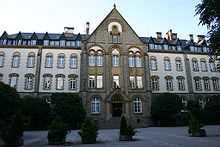
Luxembourg's education system is trilingual: the first years of primary school are in Luxembourgish, before changing to German; while in secondary school, the language of instruction changes to French.[199] Proficiency in all three languages is required for graduation from secondary school, but half the students leave school without a certified qualification, with the children of immigrants being particularly disadvantaged.[200] In addition to the three national languages, English is taught in compulsory schooling and much of the population of Luxembourg can speak English. The past two decades have highlighted the growing importance of English in several sectors, in particular the financial sector. Portuguese, the language of the largest immigrant community, is also spoken by large segments of the population, but by relatively few from outside the Portuguese-speaking community.[201]
The University of Luxembourg is the only university based in Luxembourg. In 2014, Luxembourg School of Business, a graduate business school, was created through private initiative and received the accreditation from the Ministry of Higher Education and Research of Luxembourg in 2017.[202][203] Two American universities maintain satellite campuses in the country: Miami University (Dolibois European Center) and Sacred Heart University (Luxembourg Campus).[204]
Health
According to data from the World Health Organization, healthcare spending on behalf of the government of Luxembourg topped $4.1 Billion, amounting to about $8,182 for each citizen in the nation.[205][206] The nation of Luxembourg collectively spent nearly 7% of its Gross Domestic Product on health, placing it among the highest spending countries on health services and related programs in 2010 among other well-off nations in Europe with high average income among its population.[207]
Culture

Luxembourg has been heavily influenced by the culture of its neighbors. It retains a number of folk traditions, having been for much of its history a profoundly rural country. There are several notable museums, located mostly in the capital. These include the
The country has produced some internationally known artists, including the painters Théo Kerg, Joseph Kutter and Michel Majerus, and photographer Edward Steichen, whose The Family of Man exhibition has been placed on UNESCO's Memory of the World register, and is now permanently housed in Clervaux. Editor and author Hugo Gernsback, whose publications crystallized the concept of science fiction, was born in Luxembourg City. Movie star Loretta Young was of Luxembourgish descent.[209]
Luxembourg was a founding participant of the Eurovision Song Contest, and participated every year between 1956 and before it was relegated after the 1993 competition, with the exception of 1959. Although Luxembourg was free to participate again in 1995, it chose not to return to the competition before 2024. It has won the competition a total of five times, 1961, 1965, 1972, 1973 and 1983 and hosted the contest in 1962, 1966, 1973, and 1984. Only nine of its 38 entries before 2024, and none of its five winning entries, were performed by Luxembourgish artists.[210] On its 2024 return, this was, however, with a particular emphasis on promoting music and artists from Luxembourg.[211]
Luxembourg was the first city to be named European Capital of Culture twice. The first time was in 1995. In 2007, the European Capital of Culture was to be a cross-border area consisting of the Grand Duchy of Luxembourg, the Rheinland-Pfalz and Saarland in Germany, the Walloon Region and the German-speaking part of Belgium, and the Lorraine area in France.[212] The event was an attempt to promote mobility and the exchange of ideas, crossing borders physically, psychologically, artistically and emotionally.[citation needed]
Luxembourg was represented at the World Expo 2010 in Shanghai, China, from 1 May to 31 October 2010 with its own pavilion.[213][214] The pavilion, designed as a forest and fortress, was based on the transliteration of the word Luxembourg into Chinese, "Lúsēnbǎo", which when directly translated, means "forest and fortress". It represented Luxembourg as the "Green Heart in Europe".[215]
Sports

Unlike most countries in Europe, sports in Luxembourg are not concentrated upon a particular
Cuisine
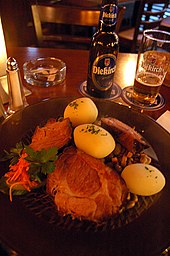
Luxembourg cuisine reflects its position on the border between the Latin and Germanic worlds, being heavily influenced by the cuisines of neighboring France and Germany. More recently,[when?] it has been enriched by its many Italian and Portuguese immigrants.[citation needed]
Most native Luxembourg dishes, consumed as the traditional daily fare, share roots in the country's folk dishes, the same as in neighboring Germany.[219]
Luxembourg sells the most alcohol in Europe per capita.[220] However, the large proportion of alcohol purchased by customers from neighboring countries contributes to the statistically high level of alcohol sales per capita; this level of alcohol sales is thus not representative of the actual alcohol consumption of the Luxembourg population.[221]
Luxembourg has the second highest number of Michelin-starred restaurants per capita with Japan ranked at number one and Switzerland following Luxembourg at number three.[222]
Media
The main languages of media in Luxembourg are French and German. The newspaper with the largest circulation is the German-language daily Luxemburger Wort.[223] Because of the strong multilingualism in Luxembourg, newspapers often alternate articles in French and articles in German, without translation. In addition, there are both English and Portuguese radio and national print publications, but accurate audience figures are difficult to gauge since the national media survey by ILRES is conducted in French.[224]
Luxembourg is known in Europe for its radio and television stations (
Due to a 1988 law that established a special tax scheme for audiovisual investment, the film and co-production in Luxembourg has grown steadily.[226] There are some 30 registered production companies in Luxembourg.[227][228]
Luxembourg won an
Notable Luxembourgers
See also
References
Informational notes
- ^ European Union since 1993.
- ^ Luxembourgish: Groussherzogtum Lëtzebuerg [ˈɡʀəʊ̯sˌhɛχtsoːχtum ˈlətsəbuəɕ]; French: Grand-Duché de Luxembourg [ɡʁɑ̃ dyʃe də lyksɑ̃buʁ] ⓘ; German: Großherzogtum Luxemburg [ˈɡʁoːsˌhɛʁtsoːktuːm ˈlʊksm̩bʊʁk] ⓘ.
Citations
- ^ "The World Factbook". Central Intelligence Agency. 24 November 2020. Archived from the original on 9 January 2021. Retrieved 11 December 2020.
- ^ Eurobarometer 90.4: Attitudes of Europeans towards Biodiversity, Awareness and Perceptions of EU customs, and Perceptions of Antisemitism. European Commission. Archived from the original on 13 March 2020. Retrieved 15 July 2019 – via GESIS.
- Organisation for Economic Co-operation and Development (OECD). Archivedfrom the original on 24 March 2021. Retrieved 11 October 2020.
- ^ "Une croissance démographique réduite en 2023" (PDF). statistiques.public.lu (in French). 18 April 2024.
- ^ "Évolution de la population". Statistiques - Luxembourg (in French). 10 February 2023. Archived from the original on 16 April 2023. Retrieved 18 April 2023.
- ^ a b c d "World Economic Outlook Database, April 2024 Edition". IMF.org. International Monetary Fund. Retrieved 18 April 2024.
- ^ "Gini coefficient of equivalised disposable income – EU-SILC survey". ec.europa.eu. Eurostat. Archived from the original on 9 October 2020. Retrieved 9 August 2021.
- ^ "Human Development Report 2023/2024" (PDF). United Nations Development Programme. 13 March 2024. Archived (PDF) from the original on 13 March 2024. Retrieved 13 March 2024.
- ^ "Luxembourg". The American Heritage Dictionary of the English Language (5th ed.). HarperCollins. Retrieved 1 October 2019.
- ^ "Europe :: Luxembourg — The World Factbook - Central Intelligence Agency". www.cia.gov. Archived from the original on 9 January 2021. Retrieved 12 December 2020.
- Centre virtuel de la connaissance sur l'Europe. 2014. Archived from the originalon 13 October 2019. Retrieved 24 October 2017.
- ^ "Luxembourg | national capital, Luxembourg". Encyclopedia Britannica. Archived from the original on 17 November 2020. Retrieved 12 December 2020.
- ^ a b c d e "Loi du 24 février 1984 sur le régime des langues". legilux.public.lu. Archived from the original on 18 September 2023. Retrieved 13 September 2021.
- ^ Constitution du Grand Duché de Luxembourg (in French, Luxembourgish, and German). Brochure distribuée par la chambre des députés (48 pages). 2023. p. 4 : Chapter I, Section 1, article 4. "La langue du Grand-Duché de Luxembourg est le luxembourgeois. La loi règle l'emploi des langues luxembourgeoise, francaise et allemande.".
- ^ "Eurostat – Tables, Graphs and Maps Interface (TGM) table". Epp.eurostat.ec.europa.eu. Archived from the original on 18 April 2009. Retrieved 21 February 2010.
- ^ "La démographie luxembourgeoise en chiffres" (PDF). Le Portail des Statistiques (in French). Archived from the original (PDF) on 21 March 2022. Retrieved 1 November 2021.
- ^ "Country comparison :: POPULATION growth rate". The World Factbook. Archived from the original on 27 May 2016. Retrieved 16 April 2017.
- ^ Krouse, Sarah (1 January 2018). "Piping Hot Gromperekichelcher, Only if You Pass the Sproochentest". The Wall Street Journal. p. 1.
- ^ "Country Ranking - Rainbow Europe". rainbow-europe.org. Archived from the original on 21 May 2019. Retrieved 28 October 2021.
- ^ "Human Development Report 2021/2022" (PDF). United Nations Development Programme. 8 September 2022. Archived (PDF) from the original on 8 September 2022. Retrieved 8 September 2022.
- ^ a b "City of Luxembourg: its Old Quarters and Fortifications". World Heritage List. UNESCO, World Heritage Convention. Archived from the original on 26 January 2020. Retrieved 16 April 2017.
- ^ "European Union | Definition, Purpose, History, & Members". Encyclopedia Britannica. Archived from the original on 9 October 2023. Retrieved 12 December 2020.
- ^ Timeline: Luxembourg – A chronology of key events Archived 13 May 2007 at the Wayback Machine BBC News Online, 9 September 2006. Retrieved 8 October 2006.
- ^ a b "Independent Luxembourg". Encyclopedia Britannica. Archived from the original on 5 March 2021. Retrieved 12 December 2020.
- ^ "Asselborn's final Security Council meeting". Luxemburger Wort. 19 December 2014. Archived from the original on 10 October 2017. Retrieved 2 April 2015.
- ISBN 978-2-87999-298-3. Archivedfrom the original on 24 January 2024. Retrieved 24 January 2024.
- ^ Kreins, Jean-Marie (2010). Histoire du Luxembourg (5 ed.). Paris, France: Presses Universitaires de France.
- ISBN 978-2-87999-298-3. Archivedfrom the original on 24 January 2024. Retrieved 24 January 2024.
- ^ "Henry VII, Holy Roman emperor". Encyclopedia Britannica. Archived from the original on 31 March 2019. Retrieved 12 December 2020.
- ^ a b "Luxembourg - History". Encyclopedia Britannica. Archived from the original on 5 March 2021. Retrieved 12 December 2020.
- ISBN 978-2-87999-298-3. Archivedfrom the original on 24 January 2024. Retrieved 24 January 2024.
- ^ "City of Luxembourg: its Old Quarters and Fortifications". UNESCO World Heritage Centre. Archived from the original on 5 October 2020. Retrieved 12 August 2021.
- ISBN 978-2-87999-298-3. Archivedfrom the original on 24 January 2024. Retrieved 24 January 2024.
- ^ ISBN 978-2-87999-298-3. Archivedfrom the original on 24 January 2024. Retrieved 24 January 2024.
- ^ OCLC 4774770.
- ^ Michel Pauly, Geschichte Luxemburgs 2013 p. 9
- ^ Michel Pauly, Geschichte Luxemburgs 1988 (2013)p. 16
- ^ "Mosaïque de Vichten". -: Mosaïque de Vichten, -: - -. Archived from the original on 21 April 2021. Retrieved 21 April 2021.
- ^ OCLC 52386195.
- ^ "Francique". www.axl.cefan.ulaval.ca. Archived from the original on 26 January 2021. Retrieved 21 April 2021.
- ^ Michel Pauly, Geschichte Luxemburgs 2013 p. 23
- ^ The Emperor's Bible". Uppsala University Library. Retrieved 17 October 2020
- OCLC 724990605.
- ^ "Luxembourg's Origins". 9 January 2024. Archived from the original on 24 January 2024. Retrieved 24 January 2024.
- ^ Michel Pauly, Geschichte Luxemburgs 2013 p. 26
- ^ Kreins (2003), p. 20
- ISBN 978-2-87999-298-3. Archivedfrom the original on 24 January 2024. Retrieved 24 January 2024.
- ^ Michel Pauly, Geschichte Luxemburgs 2013 p. 28
- ^ Michel Pauly, Geschichte Luxemburgs 2013 p.33-34
- ^ Michel Pauly, Geschichte Luxemburgs 2013 p.35
- ^ Michel Pauly, Geschichte Luxemburgs 2013 p.37
- ^ Margue, Paul (1974). Luxemburg in Mittelalter und Neuzeit. Editions Bourg-Bourger.
- ^ Gilbert Trausch, Le Luxembourg, émergence d'un état et d'une nation 2007 p. 93 Edition Schortgen
- ^ "At the Helm of the Holy Roman Empire". Luxembourg.lu. 9 January 2024. Archived from the original on 24 January 2024. Retrieved 24 January 2024.
- ^ Michel Pauly, Geschichte Luxemburgs 2013 p. 41
- ^ Kreins (2003), p. 39
- ^ Michel Pauly, Geschichte Luxemburgs 2013 p. 44
- ^ Michel Pauly, Geschichte Luxemburgs 2013 p.53
- ^ a b Michel Pauly, Geschichte Luxemburgs 2013 p.57
- ^ Michel Pauly, Geschichte Luxemburgs 2013 p.58
- ^ "Dark Luxembourg: The French massacre of Differdange". Archived from the original on 6 October 2021. Retrieved 6 October 2021.
- ^ "LUXEMBOURG - 17 mai 1794 - MASSACRE DE DUDELANGE - l'HORRIBLE FIN DE PIERRE GAASCH, GARDE-FORESTIER ... - la Maraîchine Normande". 24 March 2016. Archived from the original on 6 October 2021. Retrieved 6 October 2021.
- ^ a b Kreins (2003), p.64
- ^ a b Michel Pauly, Geschichte Luxemburgs 2013 p.65
- ^ Kreins (2003), p. 66
- ^ Michel Pauly, Geschichte Luxemburgs 2013 p.67
- ^ Johan Christiaan Boogman: Nederland en de Duitse Bond 1815–1851. Diss. Utrecht, J. B. Wolters, Groningen / Djakarta 1955, pp. 5–8.
- ^ Michel Pauly Die Geschichte Luxemburgs 2013 p. 68
- ^ Thewes, Guy (2006) (PDF). Les gouvernements du Grand-Duché de Luxembourg depuis 1848 (2006), p. 208
- ^ "LUXEMBURG Geschiedenis". Landenweb.net. Archived from the original on 10 May 2013. Retrieved 1 February 2013.
- ^ "The World Factbook". Central Intelligence Agency. Archived from the original on 27 February 2013. Retrieved 1 February 2013.
- ^ Microsoft Encarta Encyclopedia 1997
- ^ Kreins (2003), p. 76
- ^ ISBN 978-0-19-022863-7
- ^ Kreins (2003), pp. 80–81
- ISBN 978-1-107-03760-1
- ^ Michel Pauly, Geschichte Luxemburgs 2013 p.75
- ^ Kreins (2003), p. 84
- ^ "The First World War: German Occupation and State Crisis". Luxembourg.lu. 9 January 2024. Archived from the original on 24 January 2024. Retrieved 24 January 2024.
- ^ Michel Pauly, Geschichte Luxemburgs 2013 p.83
- ISBN 978-2-87999-298-3. Archivedfrom the original on 24 January 2024. Retrieved 24 January 2024.
- ^ "Gëlle Fra – a Hallmark of Society and Luxembourgish History". Luxembourg.lu. 26 June 2023. Archived from the original on 24 January 2024. Retrieved 24 January 2024.
- ^ a b Thewes (2003), p. 81
- ^ a b Kreins (2003), p. 89.
- ^ Michel Pauly, Geschichte Luxemburgs 2013 p.84
- ^ a b Michel Pauly, Geschichte Luxemburgs 2013 p.85
- ^ Dostert et al. (2002), p. 21
- ^ Brousse, Hendry. "Le Luxembourg de la guerre à la paix (1918 – 1923): la France, actrice majeure de cette transition". hal.univ-lorraine.fr. Archived from the original on 3 March 2021. Retrieved 18 April 2021.
- ^ "The invasion of Belgium, The Netherlands and Luxembourg". Judgment of the International Military Tribunal For The Trial of German Major War Criminals. London: HM Stationery Office. 1951. Archived from the original on 7 February 2019. Retrieved 22 December 2021 – via The Nizkor Project.
- ^ Dostert, Paul. "Luxemburg unter deutscher Besatzung 1940-45: Die Bevölkerung eines kleinen Landes zwischen Kollaboration und Widerstand". Zug der Erinnerung (in German). Archived from the original on 2 June 2019. Retrieved 23 April 2021.
- ^ "The Second World War: the Toughest Ordeal". Luxembourg.lu. 9 January 2024. Archived from the original on 24 January 2024. Retrieved 24 January 2024.
- ^ Michel Pauly, Geschichte Luxemburgs 2013 p.102
- ^ "Luxembourg and NATO". NATO. Archived from the original on 14 April 2021. Retrieved 18 April 2021.
- ^ "D'Koreaner aus dem Lëtzebuerger Land (Koreans from Luxembourg)". Archived from the original on 24 January 2024. Retrieved 24 January 2024.
- ^ "ISAF (International Security and Assistance Force)". 24 April 2023. Archived from the original on 27 April 2021. Retrieved 24 April 2021.
- ^ "The Steel Industry That Made Luxembourg's Fortune". Luxembourg.lu. 9 January 2024. Archived from the original on 24 January 2024. Retrieved 24 January 2024.
- ^ solutions, EIU digital. "Democracy Index 2016 - The Economist Intelligence Unit". www.eiu.com. Archived from the original on 11 November 2019. Retrieved 29 November 2017.
- ^ "Government Composition". Gouvernement.lu. 28 May 2013. Archived from the original on 19 December 2023. Retrieved 24 January 2024.
- ^ "Mémorial A, 1868, No.25, Constitution du Grand-Duché de Luxembourg". Legilux.lu (in French). Archived from the original on 27 November 2023. Retrieved 24 January 2024.
- ^ "Constitution du Grand-Duché de Luxembourg". Legilux (in French). Retrieved 24 January 2024.
- ^ "Constitution of Luxembourg" (PDF). Service central de législation. 2005. Archived from the original (PDF) on 16 February 2008. Retrieved 23 July 2006.
- ^ "Structure of the Conseil d'Etat". Conseil d'Etat. Archived from the original on 19 June 2006. Retrieved 23 July 2006.
- ^ "Luxembourg's territory". Luxembourg.public.lu. 20 September 2020. Archived from the original on 25 September 2023. Retrieved 18 April 2023.
- ^ "Luxembourg - Communications". Encyclopedia Britannica. Archived from the original on 5 March 2021. Retrieved 12 December 2020.
- ]
- ^ "The European institutions in Luxembourg". luxembourg.public.lu. Archived from the original on 19 January 2021. Retrieved 12 December 2020.
- ^ EFTA Court homepage Archived 3 February 2023 at the Wayback Machine, Retrieved 3 February 2023.
- ^ SA, Interact. "Accueil". www.armee.lu (in French). Archived from the original on 10 March 2011. Retrieved 13 September 2017.
- ^ "Luxembourg". Aeroflight.co.uk. 8 September 2005. Archived from the original on 29 May 2015. Retrieved 23 July 2006.
- ^ "Luxembourg Army History". 2 July 2010. Archived from the original on 2 July 2010. Retrieved 19 December 2019.
- ^ "Where is Luxembourg?". WorldAtlas. Archived from the original on 3 September 2018. Retrieved 3 September 2018.
- ^ "Mountains in Luxembourg" (PDF). Archived from the original on 10 June 2007. Retrieved 24 February 2010.
{{cite web}}: CS1 maint: bot: original URL status unknown (link), recueil de statistiques par commune. statistiques.public.lu (2003) p. 20 - ^ "2012 EPI :: Rankings – Environmental Performance Index". yale.edu. 5 May 2012. Archived from the original on 5 May 2012.
- ^ "What is the greenest country in the world?". ATLAS & BOOTS. 6 June 2020. Archived from the original on 27 November 2020. Retrieved 20 November 2020.
- ^ "MAE – Luxembourg City in the top 10 of the most "livable" cities / News / New York CG / Mini-Sites". Newyork-cg.mae.lu. Archived from the original on 29 June 2017. Retrieved 23 July 2017.
- ^ SCHNUER, CORDULA. "LUX MUST "REDOUBLE ITS EFFORTS" TO MEET CLIMATE TARGETS: OECD". Delano. Archived from the original on 19 November 2020. Retrieved 20 November 2020.
- S2CID 228082162.
- ^ "Luxembourg". Stadtklima (Urban Climate). Archived from the original on 28 September 2007. Retrieved 19 April 2007.
- ^ "The Global Innovation Index 2012" (PDF). INSEAD. Archived (PDF) from the original on 30 August 2012. Retrieved 22 July 2012.
- ^ "Statistics Portal // Luxembourg – Home". Statistiques.public.lu. Archived from the original on 23 March 2015. Retrieved 2 April 2015.
- ^ Data refer mostly to the year 2011. World Economic Outlook Database-April 2012 Archived 26 October 2012 at the Wayback Machine, International Monetary Fund. Accessed on 18 April 2012.
- ^ "GDP per capita in PPS". ec.europa.eu/eurostat. Eurostat. Archived from the original on 20 January 2015. Retrieved 18 June 2020.
- ^ "2011 Index of Economic Freedom". The Heritage Foundation and The Wall Street Journal. Archived from the original on 29 June 2013. Retrieved 15 January 2011.
- ^ "World Life Quality Index 2005" (PDF). Economist Intelligence Unit. 2005. Archived (PDF) from the original on 2 August 2012. Retrieved 23 July 2006.
- from the original on 22 October 2023. Retrieved 23 October 2023.
- ^ "Luxembourg makes progress in OECD standards on tax information exchange". OECD. 8 July 2009. Archived from the original on 15 March 2015. Retrieved 24 December 2011.
- ^ "A progress report on the jurisdictions surveyed by the OECD Global Forum" (PDF). OECD. July 2009. Archived from the original (PDF) on 21 February 2011. Retrieved 3 February 2011.
- ^ Arlow, Oliver (14 March 2010). "Kim Jong-il $4bn emergency fund in European banks". Telegraph. Archived from the original on 22 May 2018. Retrieved 5 April 2018.
- ^ Griffiths, Ian (4 April 2012). "How one word change lets Amazon pays less tax on its UK activities". The Guardian. London. Archived from the original on 12 August 2016. Retrieved 17 December 2016.
- ^ "Embargo 4 October 0.01 AM Central European Times" (PDF). Financial Secrecy Index. Archived from the original (PDF) on 4 April 2015. Retrieved 2 April 2015.
- ^ Bowers, Simon (5 November 2014). "Luxembourg tax files: how tiny state rubber-stamped tax avoidance on an industrial scale". The Guardian. Archived from the original on 26 October 2015. Retrieved 12 November 2014.
- ^ "Agricultural census in Luxembourg". Eurostat. Archived from the original on 25 June 2019. Retrieved 20 July 2019.
- ^ "Gateway to the European market". Trade and Invest. Archived from the original on 10 May 2021. Retrieved 4 June 2021.
- ^ "Major foreign holders of treasury securities". U.S. Department of the Treasury. Archived from the original on 3 February 2011. Retrieved 3 February 2011.
- ^ "What are the problems of geographic attribution for securities holdings and transactions in the TIC system?". U.S. Treasury International Capital (TIC) reporting system. Archived from the original on 11 January 2011. Retrieved 3 February 2011.
- ^ "Luxembourg National Debt 2019". countryeconomy.com. Archived from the original on 30 November 2018. Retrieved 27 June 2019.
- ^ ""The miracle of Luxembourg growth has a name, that of frontier"". Le Monde (in French). 17 February 2021. Archived from the original on 14 November 2021. Retrieved 13 November 2021.
- ^ "Longueur du réseau routier". travaux.public.lu (in French). Archived from the original on 29 April 2021. Retrieved 27 April 2021.
- ^ "About Luxembourg Airport". Luxembourg Airport. Archived from the original on 20 December 2022. Retrieved 27 April 2021.
- ^ "Trams return to Luxembourg city centre". International Railway Journal. 3 August 2018. Archived from the original on 27 April 2021. Retrieved 27 April 2021.
- ^ "List of countries by vehicles per capita". appsso.eurostat.ec.europa.eu. Archived from the original on 4 December 2022. Retrieved 5 November 2021.
- ^ Calder, Simon (29 February 2020). "Luxembourg makes history as first country with free public transport". The Independent. Archived from the original on 31 December 2020. Retrieved 29 February 2020.
- ^ "Legilux – Réseaux et services de communications électroniques". Legilux.public.lu. Archived from the original on 13 September 2016. Retrieved 2 April 2015.
- ^ "Institut Luxembourgeois de Régulation – Communications électroniques". Ilr.public.lu. Archived from the original on 21 March 2015. Retrieved 2 April 2015.
- ^ "Service des médias et des communications (SMC) – gouvernement.lu // L'actualité du gouvernement du Luxembourg". Mediacom.public.lu. Archived from the original on 20 August 2014. Retrieved 2 April 2015.
- ^ "Study on broadband coverage 2011. Retrieved on 25 January 2013". Archived from the original on 10 May 2013. Retrieved 7 October 2013.
- ^ "Household Download Index. Retrieved on 9 April 2013". Netindex.com. 6 April 2011. Archived from the original on 29 May 2015. Retrieved 7 October 2013.
- ^ "Eurohub Luxembourg – putting Europe at your fingertips" (PDF). Archived from the original on 19 November 2008. Retrieved 19 February 2010.
{{cite web}}: CS1 maint: bot: original URL status unknown (link). Ministry of Economy and Foreign Trade of Luxembourg. August 2008 - ^ "Why Luxembourg? – AMCHAM". Archived from the original on 19 December 2019. Retrieved 19 December 2019.
- ^ "Financial express special issue on Luxembourg" (PDF). 23 June 2009. Archived from the original (PDF) on 30 March 2012. Retrieved 13 August 2010.
- ^ pressinfo (23 February 2010). "Press Release: New ITU report shows global uptake of ICTs increasing, prices falling". Itu.int. Archived from the original on 2 May 2010. Retrieved 23 April 2010.
- ^ "Luxembourg ranks on the top in the ITU ICT survey".[dead link]
- ^ "Global Broadband Quality Study". Socsci.ox.ac.uk. Retrieved 2 April 2015.[permanent dead link]
- ^ "Global Broadband Quality Study Shows Progress, Highlights Broadband Quality Gap" (PDF). Said Business School, University of Oxford. Archived from the original (PDF) on 12 January 2011. Retrieved 13 August 2010.
- ^ "ams-ix.net". ams-ix.net. Archived from the original on 7 December 2006. Retrieved 7 October 2013.
- ^ "de-cix.net". de-cix.net. Archived from the original on 30 September 2013. Retrieved 7 October 2013.
- ^ "linx.net". linx.net. Archived from the original on 5 October 2013. Retrieved 7 October 2013.
- ^ "ICT Business Environment in Luxembourg". Luxembourgforict.lu. Archived from the original on 25 June 2009. Retrieved 13 August 2010.
- ^ Tom Kettels (15 May 2009). "ICT And E-Business – Be Global from Luxembourg" (PDF). Archived (PDF) from the original on 21 July 2011. Retrieved 13 August 2010.
- ^ "PricewaterhouseCoopers Invest in Luxembourg". Pwc.com. Archived from the original on 12 May 2011. Retrieved 13 August 2010.
- ^ "Why Luxembourg? A highly strategic position in the heart of Europe". teralink.lu. Archived from the original on 11 May 2011. Retrieved 13 August 2010.
- ^ "ITU-T ICT Statistics: Luxembourg". Itu.int. Archived from the original on 5 July 2016. Retrieved 13 August 2010.
- ^ "Telx Partners with German Hub Provider ancotel to Provide Virtual Connections between U.S. and Europe" (PDF). Archived from the original (PDF) on 21 February 2011. Retrieved 13 August 2010.
- ^ "Globale Rechenzentren | Colocation mit niedrigen Latenzen für Finanzunternehmen, CDNs, Enterprises & Cloud-Netzwerke bei Equinix" (in German). Ancotel.de. Archived from the original on 15 March 2011. Retrieved 2 April 2015.
- ^ "Ancotel – Telecommunication Operator References". Ancotel.de. Archived from the original on 7 February 2007. Retrieved 13 August 2010.
- ^ "Networks Accessible in Frankfurt via the VMMR Solution offered by Telx/ancotel" (PDF). Archived from the original (PDF) on 21 February 2011. Retrieved 13 August 2010.
- ^ "Luxembourg's politicians pin economic hopes on fintech drive". Financial Times. 23 June 2017. Archived from the original on 10 December 2022. Retrieved 26 June 2018.
- ^ "European Datacentres: Luxembourg". Ict.luxembourg.lu. Archived from the original on 8 July 2014. Retrieved 2 April 2015.
- ^ "Luxembourg as a Centre for Online and ICT Business (pdf)" (PDF). SMediacom.public.lu. Archived from the original (PDF) on 25 September 2013. Retrieved 2 April 2015.
- ^ "Invest, Innovate, Export | Luxembourg as a smart location for business". Trade and Invest. Archived from the original on 23 December 2019. Retrieved 19 December 2019.
- ^ "ebrc Datacenter Facilities". Ebrc.lu. Archived from the original on 21 October 2013. Retrieved 2 April 2015.
- ^ "LuxConnect ICT campus Bettembourg DC 1.1". Luxconnect.lu. Archived from the original on 1 May 2015. Retrieved 2 April 2015.
- ^ "LuxConnect ICT campus Bissen/Roost DC 2". Luxconnect.lu. Archived from the original on 7 March 2015. Retrieved 2 April 2015.
- ^ "Uptime Tier Certification". Uptimeinstitute.com. Archived from the original on 6 May 2015. Retrieved 2 April 2015.
- ^ "New data center study: Luxembourg in pole position". Ict.luxembourg.lu. Archived from the original on 4 May 2015. Retrieved 2 April 2015.
- ^ "Soluxions magazine: Luxembourg en pole position". Soluxions-magazine.com. Archived from the original on 15 September 2013. Retrieved 2 April 2015.
- ^ "Population par nationalités détaillées au 1er janvier". Archived from the original on 25 April 2023. Retrieved 25 April 2023.
- ^ "Luxembourg Presidency – Being a Luxembourger". Eu2005.lu. 29 December 2004. Archived from the original on 30 December 2016. Retrieved 25 April 2010.
- ^ "Population par sexe et par nationalité (x 1 000) 1981, 1991, 2001–2013". Le portail des Statistiques. Archived from the original on 29 March 2022. Retrieved 9 April 2014.
- ^ "La progression de la population du Grand-Duché continue: 537 039 résidants au 1er janvier 2013." Archived 13 January 2017 at the Wayback Machine Statnews 16/2013, op statec.lu, 18 April 2013. (in French).
- ^ Amanda Levinson. "The Regularisation of Unauthorised Migrants: Literature Survey and Country Case Studies – Regularisation programmes in Luxembourg" (PDF). Centre on Migration, Policy and Society, University of Oxford. Archived from the original (PDF) on 30 April 2005. Retrieved 2 September 2006.
- ^ "Origins of Luxembourgish (in French)". Migration Information Source. Archived from the original on 21 February 2011. Retrieved 8 February 2010.
- ^ "Parlement européen – Lëtzebuergesch léieren (FR)". Europarl.europa.eu. 14 December 2000. Archived from the original on 25 December 2014. Retrieved 2 April 2015.
- (PDF) from the original on 24 February 2023. Retrieved 24 February 2023.
- ^ "Europeans and their Languages" (PDF). 6 January 2016. Archived from the original (PDF) on 6 January 2016. Retrieved 13 September 2021.
- ^ STATEC (2013). "Informations statistiques récentes" (PDF). Archived from the original (PDF) on 20 September 2021. Retrieved 17 September 2021.
- ^ a b "What languages do people speak in Luxembourg?". luxembourg.public.lu. Archived from the original on 21 June 2021. Retrieved 13 September 2021.
- ^ a b "D'Lëtzebuergescht, bald eng langue morte?!". Guy Kaiser Online. 12 August 2020. Archived from the original on 16 October 2021. Retrieved 16 October 2021.
- ^ STATEC (2013). "Informations statistiques récentes STATEC" (PDF). Archived from the original (PDF) on 20 September 2021. Retrieved 17 September 2021.
- ^ Les langues dans les offres d'emploi au Luxembourg (1984-2014), Université du Luxembourg, IPSE Identités, Politiques, Sociétés, Espaces, Working Paper, Juin 2015
- ^ "À propos des langues" (PDF) (in French). Service Information et Presse. pp. 3–4. Archived from the original (PDF) on 27 September 2013. Retrieved 1 August 2006.
- ^ "Lëtzebuergesch gëtt ëmmer méi aus dem Alldag verdrängt". MOIEN.LU (in Luxembourgish). 25 February 2021. Archived from the original on 16 October 2021. Retrieved 16 October 2021.
- from the original on 16 October 2021. Retrieved 16 October 2021.
- ^ "D'Wort article (German)" (in French). wort.lu. Archived from the original on 22 May 2008. Retrieved 24 July 2007.
- ^ "Mémorial A, 1979, No. 29" (PDF) (in French). Service central de législation. Archived from the original (PDF) on 22 August 2006. Retrieved 1 August 2006.
- ^ "World Factbook – Luxembourg". Central Intelligence Agency. 19 December 2006. Archived from the original on 9 January 2021. Retrieved 13 January 2007.
- ^ "Table: Religious Composition by Country, in Percentages | Pew Research Center's Religion & Public Life Project". Features.pewforum.org. 18 December 2012. Archived from the original on 1 January 2013. Retrieved 2 April 2015.
- ^ Eurobarometer on Social Values, Science and technology 2005 Archived 24 May 2006 at the Wayback Machine – page 11
- ^ "The Trilingual Education system in Luxembourg". Tel2l – Teacher Education by Learning through two languages, University of Navarra. Archived from the original on 26 June 2015. Retrieved 9 June 2007.
- ^ "Immigration in Luxembourg: New Challenges for an Old Country". Migration Information Source. Archived from the original on 11 March 2007. Retrieved 9 June 2007.
- ^ "Parlement européen – Lëtzebuergesch léieren (FR)". Europarl.europa.eu. 14 December 2000. Archived from the original on 11 May 2011. Retrieved 9 May 2010.
- ^ "Arrêté ministériel du 29 août 2017 portant accréditation de " Luxembourg School of Business " (LSB) en tant qu'établissement d'enseignement supérieur spécialisé et du programme d'études à temps partiel " Master of Business Administration " (MBA) offert par l'établissement précité. - Legilux". legilux.public.lu. Archived from the original on 23 January 2019. Retrieved 6 December 2018.
- ^ "Higher Education Institutions". www.luxembourg.public.lu. Archived from the original on 25 April 2023. Retrieved 25 April 2023.
- ^ "Home | John E. Dolibois European Center | Miami University". www.units.miamioh.edu. Archived from the original on 12 January 2017. Retrieved 28 December 2016.
- ^ "World Health Organization Regional Office for Europe". www.euro.who.int. Archived from the original on 6 November 2017. Retrieved 3 December 2017.
- ^ "Health Expenditure and Financing". stats.oecd.org. Archived from the original on 10 December 2019. Retrieved 29 November 2017.
- ^ "Overview of the Healthcare System in Luxembourg". Health Management EuroStat. Archived from the original on 8 December 2017. Retrieved 1 December 2017.
- ^ "Culture". Ministère des Affaires Etrangères, Luxembourg. Archived from the original on 22 July 2011.
- ^ "Vol. 5 Luxembourgers in the United States: Loretta Young". washington.mae.lu. 3 December 2021. Archived from the original on 15 April 2021. Retrieved 15 April 2021.
- ^ "🇱🇺 No Eurovision return for Luxembourg in 2021". ESCXTRA.com. 30 July 2020. Archived from the original on 23 August 2020. Retrieved 6 June 2021.
- ^ "Luxembourg to return to the Eurovision Song Contest in 2024". eurovision.tv. 12 May 2023. Archived from the original on 14 May 2023. Retrieved 25 May 2023.
- ^ "Luxembourg and Greater Region, European Capital of Culture 2007" (PDF). June 2008. Archived from the original (PDF) on 3 May 2011.
- ^ "Environmental Report for Expo 2010 Shanghai China" (PDF). June 2009. p. 85. Archived (PDF) from the original on 21 July 2011.
- ^ "Luxembourg pavilion at the World Expo 2010 Shanghai" (PDF). Archived from the original (PDF) on 25 September 2013. Retrieved 4 March 2010.
- ^ "Luxembourg pavilion displays green heart of Europe" (PDF). Shanghai Daily. 12 November 2007. Archived from the original (PDF) on 16 October 2011. Retrieved 24 December 2011.
- ^ "Luxembourg". Council of Europe. 2003. Archived from the original on 23 June 2004. Retrieved 25 November 2006.
- ^ "Stade de Luxembourg (Stade National) – StadiumDB.com". stadiumdb.com. Archived from the original on 10 October 2021. Retrieved 29 August 2021.
- ^ "Infrastructure". www.coque.lu. 22 February 2019. Archived from the original on 1 October 2023. Retrieved 29 August 2021.
- ^ Pokrud, Kathleen (2 February 2022). "The Grand Duchy of Luxembourg: A Culinary Story". Expat Life in Thailand. Archived from the original on 28 January 2024. Retrieved 22 January 2024.
- ^ "World/Global Alcohol/Drink Consumption 2009". Finfacts.ie. Archived from the original on 12 May 2015. Retrieved 2 April 2015.
- ^ "Consommation annuelle moyenne d'alcool par habitant, Catholic Ministry of Health" (PDF). sante.gouv.fr. 2007. Archived from the original (PDF) on 12 January 2012.
- ^ "Countries with the Highest Density of Michelin-starred Restaurants". 21 September 2021. Archived from the original on 10 August 2022. Retrieved 30 July 2022.
- ^ "Luxemburger Wort". Wort.lu. Archived from the original on 29 September 2008. Retrieved 2 April 2015.
- ^ "TNS ILRES – Home". Tns-ilres.com. Archived from the original on 20 March 2015. Retrieved 2 April 2015.
- ^ "SES SA - Company Profile and News". Bloomberg Markets. Bloomberg L.P. Archived from the original on 10 June 2021. Retrieved 10 June 2021.
- ^ "Luxembourg, a film country". Eu2005.lu. 29 December 2004. Archived from the original on 21 April 2010. Retrieved 25 April 2010.
- ^ "Film Fund Luxembourg". En.filmfund.lu. Archived from the original on 19 January 2015. Retrieved 2 April 2015.
- ^ "Luxembourgish Film Production Companies". Cna.public.lu. Archived from the original on 30 March 2012. Retrieved 2 April 2015.
- ^ "Oscars 2014 Winners: The Complete List". The Hollywood Reporter. MRC. 2 March 2014. Archived from the original on 24 July 2021. Retrieved 10 June 2021.
Works cited
- Kreins, Jean-Marie (2003). Histoire du Luxembourg (in French) (3rd ed.). Paris: ISBN 978-2-13-053852-3.
- Putnam, Ruth (1918). Luxemburg and Her Neighbours. New York: G. P. Putnam's.
- Thewes, Guy (July 2003). Les gouvernements du Grand-Duché de Luxembourg depuis 1848 (PDF) (in French) (Édition limitée ed.). Luxembourg City: Service Information et Presse. ISBN 2-87999-118-8. Archived(PDF) from the original on 9 July 2006. Retrieved 10 July 2007.
Further reading
External links
 Definitions from Wiktionary
Definitions from Wiktionary Media from Commons
Media from Commons News from Wikinews
News from Wikinews Quotations from Wikiquote
Quotations from Wikiquote Texts from Wikisource
Texts from Wikisource Textbooks from Wikibooks
Textbooks from Wikibooks Resources from Wikiversity
Resources from Wikiversity Travel information from Wikivoyage
Travel information from Wikivoyage
- The Official Portal of the Grand Duchy of Luxembourg
- Luxembourg from UCB Libraries GovPubs
- Luxembourg. The World Factbook. Central Intelligence Agency.
- Luxembourg at Curlie
- Luxembourg profile from the BBC News
- Luxembourg's Constitution of 1868 with Amendments through 2009, English Translation 2012
 Wikimedia Atlas of Luxembourg
Wikimedia Atlas of Luxembourg



